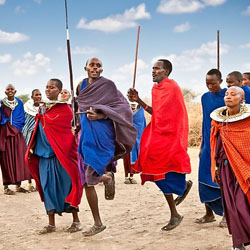Tanzania is a land of diverse cultures, where the vibrancy of local traditions and customs can be felt in every corner of the country. From the colourful Maasai people and their distinctive jumping dance to the rhythmic beats of the traditional ngoma drums, Tanzania Local Culture is a feast for the senses. Whether it's exploring the bustling markets of Dar es Salaam or taking part in a traditional Swahili wedding ceremony, Tanzania's cultural heritage is a treasure trove waiting to be discovered during Tanzania Safari.
Shaking hands and saying Jambo (Hello) is the most common form of greeting in Tanzania. Generally, it is considered very important to social manners. Tanzania is culturally diverse that is extremely rich in ancient cultures and traditions. The locals are known for their friendly nature and courtesy to visitors. There are more than 120 ethnic groups and diverse religious beliefs living in the nation.
Tanzania is home to more than 120 different ethnic groups, each with its own unique language and culture. Swahili, also known as Kiswahili, is the official language of Tanzania and is widely spoken throughout East Africa. It is a Bantu language with Arabic influences, and it has become a lingua franca in the region, used for communication between different ethnic groups and for international trade. English is also the official language of Tanzania and is widely used in government, education, and business.
Music and dance are an integral part of local Culture In Tanzania n, with a wide variety of traditional styles and genres that reflect the country's diverse ethnic groups. The most well-known Tanzanian musical tradition is taarab, which combines Arabic, Indian, and Swahili influences and is popular along the coast. Other popular genres include bongo flava, a fusion of hip hop, R&B, and traditional Tanzanian music, and ngoma, a style of traditional drumming and dance. The Maasai people are known for their distinctive jumping dance, while the Sukuma people have their own unique styles of traditional dance.
Tanzanian Food culture is diverse, influenced by the country's many ethnic groups and its location on the coast of East Africa. Tanzanian cuisine is known for its bold flavours, spices, and fresh ingredients, with a mix of African, Arabic, and Indian influences. One of the most popular dishes is ugali, a starchy porridge made from maize flour that is often served with stews, curries, or grilled meat. Other popular dishes include pilau rice, biryani, and chapati bread, which are influenced by Indian cuisine. Seafood is also a staple along the coast, with dishes like grilled fish, octopus curry, and coconut rice being popular.
Marriage in Tanzania is an important social and cultural institution vary among the country's ethnic groups. In some communities, arranged marriages are still common, while in others, young people are free to choose their own partners. Weddings are typically large and festive local Culture In Tanzania with extended family members and friends gathering to celebrate the union. In many communities, the bride's family is expected to provide a dowry, which can consist of money, livestock, or other valuable items. In some cases, the groom's family may also be expected to pay a bride price.
Traditional dress in Tanzania is varied and diverse in Tanzania. The Maasai people are perhaps the most well-known for their distinctive attire, which includes brightly coloured shukas (cloth wraps) and beaded jewellery. The Chaga people of northern Tanzania also have a distinctive traditional dress, which includes colourful woven hats and cloths known as kanga. In coastal areas, the traditional dress is influenced by Arab and Indian cultures, with women often wearing colourful kangas and hijabs. Men often wear kanzu, a long white tunic, and kofia, a small round cap.
Tanzania is renowned as a culturally rich country with incredible cultures and traditions to experience. One of the most iconic cultural experiences is visiting a Maasai village, where visitors can learn about the Maasai people's way of life and traditions, including their distinctive attire, dance, and music.
Other cultural experiences include visiting the Chaga people in Northern Tanzania, who are renowned for their intricate woven baskets, and participating in a traditional coffee ceremony. Along the coast, visitors can experience the Swahili culture, which is a blend of African, Arab, and Indian influences. They can explore the winding alleys and markets of Stone Town in Zanzibar or visit the ruins of the ancient city of Kilwa Kisiwani.
Tanzanian cuisine is also an important aspect of the local Culture In Tanzania with a wide range of traditional dishes and street food to sample. It includes pilau rice, ugali, and grilled seafood. Visitors to Tanzania can immerse themselves in the country's rich local cultures by participating in cultural tours and attending festivals and events. So come along on a journey through Tanzania's local cultures and get ready to be enchanted by the rich tapestry of traditions that make this country so unique.

*Respect the local cultures in Tanzania and be aware of your actions and behaviours.

Your ultimate Tanzania Expereince, with tips, things to do, and the best things to see in Tanzania. Great for first-time and returning travellers. What's rated, underrated or overrated etc. Get it now!
Will enlighten you through the best of Tanzania’s sights and help you experience the country’s rich culture and history.
Plan a truly bespoke journey with our Travel Designers today.